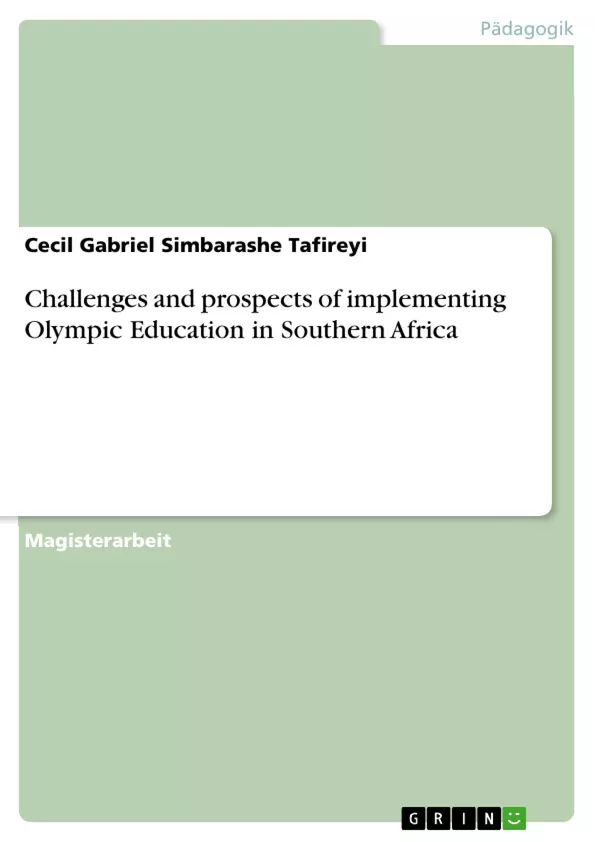The study aimed to investigate the challenges and prospects of the implementation of Olympic Education in Southern Africa. Three countries; Eswatini, South Africa, and Zimbabwe were purposively selected for the study. The content document analysis method was used to analyze content in the public domains of the Ministry of Education, National Olympic Committees, and Olympic study centers where applicable. The main themes from the content analysis were presented in the results chapter of the thesis in chapter four. Results suggest that two of the three countries-South Africa and Eswatini, investigated have not professionalized Physical Education (PE) and sport as a compulsory and examinable subject. Zimbabwe professionalized PE in 2015 and implemented the new curriculum in 2016. South Africa is the only Southern African country with an Olympic study center at the University of Johannesburg (UJ). Zimbabwe implements Olympic education through Zimbabwe Olympic Academy (ZOA). The OVEP document is the main source of Olympic Education in the South African National Olympic Committee. The study concluded that the challenges of implementing Olympic education in southern Africa are mainly no professionalization of PE and sport and lack of a pedagogical context and structure. The prospects of Olympic education implementation in Southern Africa are premised on the professionalization of PE and sport and the maximum utilization of the University of Johannesburg Olympic study center (UJOSC). The study recommends further qualitative studies be carried out in Southern Africa to increase awareness of Olympic education and also promote the professionalization of Physical Education. It also recommended further that the Olympic study center at the University of Johannesburg take an active lead in providing structures and platforms for Olympic education implementation.
Inhaltsverzeichnis
- Preface
- Dedication
- Acknowledgements
- Abstract
- Chapter 1: Introduction
- 1.1: Background of the Study
- 1.2: Problem Statement
- 1.3: Research Questions
- 1.4: Research Objectives
- 1.5: Significance of the Study
- 1.6: Scope of the Study
- 1.7: Limitations of the Study
- 1.8: Definition of Terms
- Chapter 2: Literature Review
- 2.1: Conceptual Framework
- 2.2: Historical Background of Olympic Education
- 2.3: The Olympic Movement and its Philosophy
- 2.4: Olympic Education in Southern Africa
- Chapter 3: Methodology
- 3.1: Research Design
- 3.2: Population and Sampling Techniques
- 3.3: Data Collection Methods
- 3.4: Data Analysis Techniques
- 3.5: Ethical Considerations
- Chapter 4: Results
- Chapter 5: Discussion, Summary of the Study Results, Conclusions and Recommendations
Zielsetzung und Themenschwerpunkte
Die Dissertation untersucht die Herausforderungen und Chancen der Implementierung von Olympischer Bildung in Süd-Afrika. Das Ziel ist es, das derzeitige Umfeld der Olympischen Bildung in drei ausgewählten Ländern - Eswatini, Südafrika und Simbabwe - zu analysieren, um die Hindernisse und Möglichkeiten für eine erfolgreiche Einführung dieser Bildungsinitiative zu identifizieren.
- Herausforderungen bei der Implementierung von Olympischer Bildung in Süd-Afrika.
- Chancen für die erfolgreiche Implementierung von Olympischer Bildung in Süd-Afrika.
- Analyse der bestehenden Strukturen und Rahmenbedingungen für Olympische Bildung in den drei Ländern.
- Bedeutung der Professionalität von Sport und Bewegungserziehung für die Implementierung von Olympischer Bildung.
- Entwicklung von Empfehlungen zur Optimierung der Implementierung von Olympischer Bildung in Süd-Afrika.
Zusammenfassung der Kapitel
Kapitel 1: Introduction
Diese Einleitung stellt die Problematik der Dissertation vor und definiert die Forschungsfragen, Forschungsziele, Relevanz und den Umfang der Arbeit. Außerdem werden die Grenzen der Forschung und wichtige Begrifflichkeiten definiert.
Kapitel 2: Literature Review
Dieses Kapitel analysiert den theoretischen Hintergrund der Olympischen Bildung und stellt die historische Entwicklung der Olympischen Bewegung und deren Philosophie dar. Besonderes Augenmerk liegt auf dem Kontext von Olympischer Bildung in Süd-Afrika.
Kapitel 3: Methodology
Dieses Kapitel beschreibt die Forschungsmethodik der Dissertation, einschließlich des Forschungsdesigns, der Stichprobenerhebung, der Datenerhebungsmethoden und der Datenanalysemethoden. Es beleuchtet auch die ethischen Aspekte der Forschung.
Kapitel 4: Results
In diesem Kapitel werden die Ergebnisse der Untersuchung präsentiert und analysiert.
Schlüsselwörter
Olympische Bildung, Süd-Afrika, Eswatini, Südafrika, Simbabwe, Sportpädagogik, Herausforderungen, Chancen, Implementierung, Professionalität, Olympische Bewegung, Philosophie, Universität Johannesburg.
Häufig gestellte Fragen
Was ist Olympische Bildung?
Es ist eine pädagogische Initiative, die die Werte der olympischen Bewegung (z. B. Fairplay, Respekt) in Schulen und Sportprogrammen vermittelt.
Welche Länder wurden in der Studie untersucht?
Die Dissertation untersucht die Implementierung in Eswatini, Südafrika und Simbabwe.
Was sind die größten Herausforderungen im südlichen Afrika?
Die Hauptprobleme sind die mangelnde Professionalisierung von Sportunterricht als Pflichtfach und das Fehlen pädagogischer Strukturen.
Welche Rolle spielt die Universität Johannesburg?
Die Universität beherbergt das einzige olympische Studienzentrum der Region (UJOSC) und soll eine Führungsrolle bei der Implementierung übernehmen.
Wie unterscheidet sich Simbabwe von den anderen Ländern?
Simbabwe hat Sportunterricht (PE) bereits 2015 professionalisiert und ein neues Curriculum eingeführt, was als positiver Ausblick gewertet wird.
- Quote paper
- Cecil Gabriel Simbarashe Tafireyi (Author), 2019, Challenges and prospects of implementing Olympic Education in Southern Africa, Munich, GRIN Verlag, https://www.grin.com/document/937893



